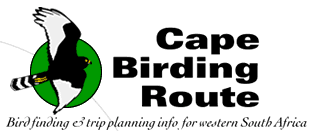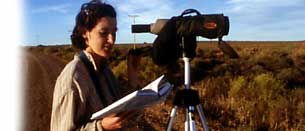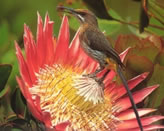|
|
Robben
Island and Sea Point:
As the place where Nelson Mandela spent many of his prison years,
Robben Island is burdened with a notoriety disproportionate
to its small size and unprepossessing appearance. However, for
birders, it is renowned not only for its sinister political
history: the island supports significant seabird breeding colonies,
including a substantial population of the endemic African
Penguin (p.32*), and is of additional local interest
in that it plays host to two introduced species found nowhere
else in South Africa. The prison, including Nelson Mandela’s
cell, are visited as part of the 3-hour organized tour, including
ferry transport, that is currently the only way to visit the
island. Ferries depart from the Waterfront hourly from 09h00
to 12h00, and at 14h00.
In
1964, customs officials in Cape Town used the island as a
conveniently isolated depot for half a dozen captive-bred
Chukar Partridges, which are native to Europe and Asia.
The birds have since flourished, and small coveys are usually
seen on the prescribed bus tour as they scurry through the
alien thicket and low scrub that covers much of the terrain.
Found
lurking in the denser thicket is the other introduced species
that gives the island its birding reputation — Common
Peafowl. Though many small feral populations of this familiar
species exist in South Africa, only the Robben Island birds
have been officially recognized as genuinely wild-breeding,
thus legitimately worthy of listing.
Of
rather higher significance in a global context are the substantial
breeding colonies of African
Penguin, Bank Cormorant (breeding on the harbour
breakwater; see box, p.21), Crowned Cormorant, African
Black Oystercatcher (p.32*), Hartlaub’s Gull
and Swift Tern. These are all easily seen along
the island’s coastline. A boardwalk offers access to
the penguin colony. There can also be interesting seabirding
en route to and from the island, and Sabine’s Gulls
may be seen lifting off the waves on tri-coloured wings as
the ferry ploughs its way across Table Bay in summer. Arctic
and Pomarine Skuas can also been seen in summer, while
in winter Subantarctic Skuas mercilessly harry the
other seabirds for their hard-won meals.
For
those with limited time, or less of a stomach for the choppy
ride across the bay, there is plenty to see along the city’s
western seaboard. The alternately rocky and sandy shoreline
from the Waterfront westward to the suburbs of Mouille Point
and Sea Point supports small numbers of roosting African
Black Oystercatchers, Cape and Crowned Cormorants,
as well as Swift and Common Terns. South of
Sea Point, the coastal road passes through the haunts of Cape
Town’s wealthiest and trendiest, the suburbs of Camps
Bay, Clifton and Bantry Bay. At Bakoven, good numbers of the
globally threatened Bank Cormorant
breed on the elephant-like boulders that lie just offshore,
and are best observed by telescope.
|
This website is maintained by Birding Africa.
Please do not use any text, images or content from this site without
permission.
© Birding Africa 1997-2009 info@capebirdingroute.org
4 Crassula Way, Pinelands, 7405, Cape Town, South Africa
|

27/09/09: Dalton
Gibbs reports back from Gough
Island! Read the blog!
26/09/09: New Cape
Town Pelagics trip report from trips of 12 and 19 September
2009.
30/08/09: British
Birdwatching Fair at Rutland Water proved very successful,
with sunny weather and over 20,000 visitors. Callan's "Birding
Namibia and the Okavango" was the most highly-attended
lecture on the Saturday, with over 240 people. Congratulations
to the winners of the Birding Africa competition and the
African Bird Club raffle that we helped sponsor!
12/08/09: New Cape
Town Pelagics trip reports from August and July 2009.
Highlights: Little
Shearwater and more!
07/08/09: The
sub-adult Black Sarrowhawk visits our garden again! Read
on about Raptor Research in the Western Cape.
27/07/09: Cape
Town's Verreauxs' Eagle Chick has grown! And its sibling
never had a chance to hatch. See the pictures of the chick,
its nest and the breeding pair. Find out more about the Western
Cape Raptor Research Programme.
27/07/09: To follow modern nomenclature and systematics, we've
adopted the IOC
World Bird List, Version 2.1.
13/07/09: The 8th
African Bird ID Challenge has launched! Win a 50% discount
on a Cape Town Pelagics
trip, a copy of Southern
African Birdfinder, or African
Bird Club membership for 1 year.
6 July 09: Cape
White-eye research in our garden.
2 July 09: Cape
Town's Verreauxs' Eagle Chick has hatched! See the pictures
of the chick, its nest and the breeding pair. Find out more
about the Western Cape Raptor Research Programme.
2 July 09: Campbell
Fleming, a Cape Town scholar, avid birder and photographer,
joined Birding Africa last month as an intern. Click here,
to see what he got up to.
2 July 09: New pelagic
trip reports from the Cape Town Pelagics trips in June
2009. Highlights: Slenderbilled
Prion and Leach's Storm Petrel
30 july 09: Our latest Cape Fynbos and Karoo trip
reports feature Hottentot
Buttonquail, Cinnamon-breasted
Warbler and other fynbos and Karoo endemics...
26 June 09: Tungsten
mining threatens RAMSAR site, South Africa's Verlorenvlei.
Read the Media Release.
22 June 09: Claire
Spottiswoode, one of the Cape Birding Route founders,
was part of the exploratory team at Mount Mabu. The mountain
is part of the newly discovered largest
rainforest in Southern Africa.
11 June 09: A colour-ringed
Black Sparrowhawk visits the Birding Africa office garden.
Read why it's a 10 months old male!
14 June 09:
Wildlife
at the office of The Cape Birding Route, Birding Africa
and Cape Town Pelagics.
31 May 09:
Michel Watelet wins the 7th African Bird Club & Birding Africa
ID Challenge. Test your African birding skills and WIN
a Birding
Africa Cape town day trip or a copy of the Birdfinder!
30 May 09:
A tragedy unfolds at Kommetjie south of Cape town as 44 beached
False
Killer Whales were shot. Click here for more details and
pictures.
14 March 09: Raptor
Watch in Cape Town on 14 March 09
|
|


